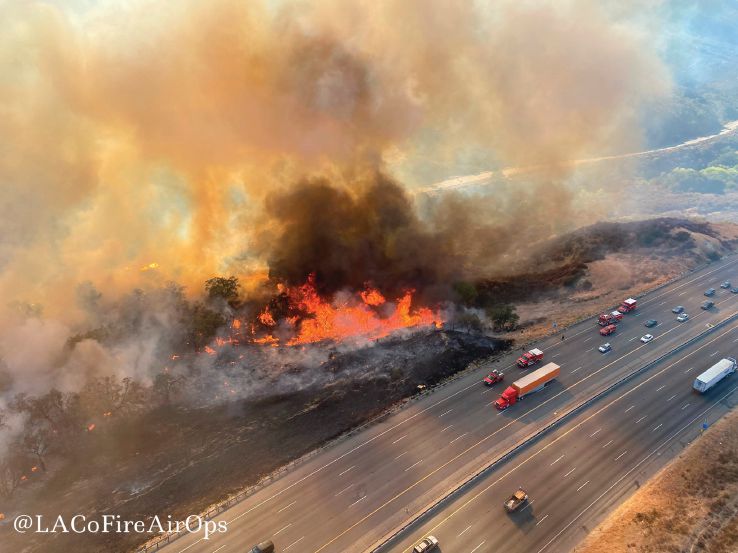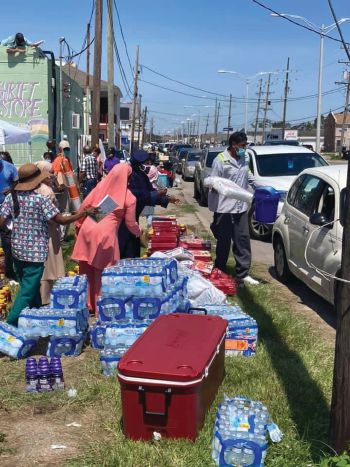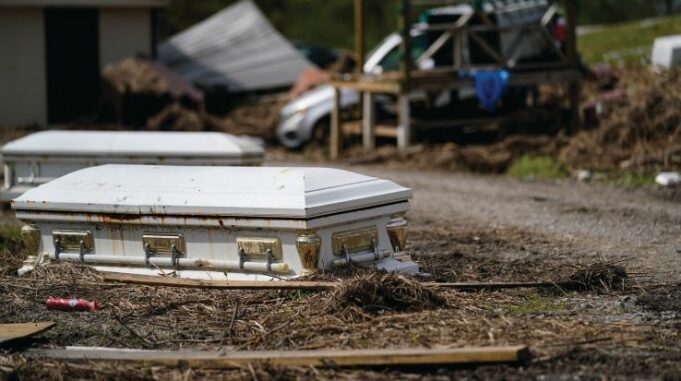“The Holy Qur’an prophesies of calamities, one right after the other. This we are witnessing with our own eyes. O America, O America, where shall ye flee?”
—The Most Honorable Elijah Muhammad, “The Fall of America”
Though it has been weeks since Hurricane Ida wreaked havoc across the Gulf Coast and East Coast, killing at least 50 people, recovery and cleanup is far from over. The devastating storm caused historic flooding and tornadoes, leaving an estimated over $95 billion in damages.
The U.S. oil industry was impacted in such a way by the storm’s 150 miles per hour winds in the Gulf of Mexico causing a cutoff of most offshore oil and gas production for over a week, making oil losses the worst in 16 years, while today 12 percent of the U.S. oil production still remains at a standstill.
“The disruption in oil flow will have a reverberating impact on many U.S. industries,” stated Douglas Kent, executive vice president of strategy and alliances at the Association for Supply Chain Management.
Trucking companies will be responsible for bringing in new supplies to areas recovering from the storm. “When we see these massive increases in transportation costs, it’s clear somebody will have to pay for it. One more disruption could send the global supply chain into complete chaos,” stated Mr. Kent.

In Louisiana where Hurricane Ida made landfall in early August, recovery and rebuilding efforts are slow.
Student Minister Willie Muhammad of Muhammad Mosque No. 46 in New Orleans told The Final Call that electricity in the city has been restored. “What many people are experiencing now is going back and forth with the insurance companies to secure funds to allow for proper repair of homes. The greater hardships exist in the lower line parishes outside of New Orleans that are in need of electricity. In St. John the Baptist Parish, 9,000 residents are without electricity,” he said.
“There are people in these parishes that are still in need of financial assistance, food, clothing, shelter, water, and more,” he added.
“About 70,000 students across southeast Louisiana remain out of school because of Hurricane Ida’s destruction to classroom buildings a month ago,” stated Cade Brumley, Louisiana state superintendent of education.
In the hardest hit areas, Hurricane Ida flooded schools, ripped off classroom roofs, blew out parts of buildings and wrecked buses, making it more difficult to get children back into learning environments. Internet service is out in areas, making virtual learning impossible. And some teachers and staff are living out of their districts because their homes were destroyed or heavily damaged. According to Associated Press, Ironton, Grand Isle, Houma, Lafitte and Barataria are still suffering from the devastating effects of the Category 4 storm.
“Churches and charity organizations are working to help, but the destruction is so far-reaching, there don’t seem to be enough donations to go around,” said Michael Williamson, head of the United Way of Southeast Louisiana, which covers seven parishes hit by Ida, according to the AP.
The storage room in the United Way’s New Orleans headquarters—typically filled with donated food, water, tarps and cleaning supplies for residents in storm-battered communities—is nearly bare. Donations have been slow to trickle in compared to previous storms, even smaller ones, and there’s not enough to meet the demand, Mr. Williamson said, according to the media outlet. Officials are stating recovery will take a long time, maybe even years.
Mississippi officials say Hurricane Ida caused roughly $22.5 million in damage across 19 counties in the state.
New York’s Governor Kathy Hochul said there was more than $50 million in damages, however, what’s more devastating than financial loss is the loss of life, with at least 13 people drowning in their basement apartments.
Student Minister Arthur Muhammad of Muhammad Mosque No. 7 of Harlem stated, “We are going deeper in taking our disaster preparedness more seriously in this hour. Here in New York, we are developing a disaster preparedness team. A team of believers who are professional firefighters, EMS, police and they will be emergency response. They will have generators and pumps and will be dispatched to any Believer in the area that needs assistance; our disaster preparedness team will be dispatched to them.”

Thousands of families are also now swamped with financial losses because they didn’t have flood insurance.
“When we called the insurance company, the first thing they told us is they don’t provide any assistance for anything that’s caused by a storm. And they left it at that,” said Amit Shivprasad, his rising voice echoing frustrations shared among his neighbors in the Jamaica section of Queens.
Flood damage is not covered by homeowners or renters’ insurance policies. People without a flood policy have few options for getting help paying for damage, according to Loretta Worters, a spokesperson for the Insurance Information Institute. They may be able to get federal assistance, she said, including low interest loans and grants.
The Federal Emergency Management Agency (FEMA) said it has already disbursed at least $22 million to nearly 5,200 families in New York City. More than 38,000 households have applied for aid.
FEMA spokesperson Michael Wade stated, “You never know, particularly with the way the world is acting right now, when that flood is going to occur in your neighborhood. All you got to do is look at this particular storm, and you’ll see that people who didn’t live in flood plains, and who have never been flooded before, all of a sudden, they got inundated with six inches of rain an hour. Now they got problems.”
According to recent data released by the World Meteorological Association, a disaster related to a weather, climate or water hazard occurred every day on average over the past 50 years—killing 115 people and causing $202 million in losses daily. Between 2005-2012 the U.S. sustained the highest economic losses resulting from several hurricanes and storms. According to the Centers for American Progress, “Extreme Weather Cost U.S. Taxpayers $99 Billion Last Year, and It Is Getting Worse,” the group stated in a Sept. 1 report of the same name.
Extreme weather in the U.S. has increased in frequency and severity, the report notes.
“Overall, the four decades of data collected by NOAA reveal two particularly concerning trends. First, the frequency of these major, damaging extreme weather events is increasing: All five top years for event frequency occurred in the past decade. With 22 events, 2020 had the most billion dollar extreme weather events of any year—nearly one-third more than the second-worst year on record, 2016, which recorded 16 events,” the report continued. NOAA (National Oceanic and Atmospheric Administration) is a scientific and regulatory agency within the U.S. Department of Commerce that forecasts and monitors weather and atmospheric conditions.
The report also noted that “2021 is following the same trend and already looks to be even more devastating than previous years. For starters, this past June was the hottest June 15 on record across the United States, and this past July was the hottest July worldwide. With recorded data from a little more than halfway through the calendar year, the United States has already experienced eight extreme weather events with costs greater than $1 billion each. The continental United States is still in hurricane season, and wildfires, exacerbated by droughts, are raging in the Western states.”
This year has really been a devastating summer in terms of the impacts that we’ve seen across the Northern Hemisphere this year,” said Jason Smerdon, a climate scientist for Columbia University’s Lamont Doherty Earth Observatory. “So this is just one more piece of bad news and lots of events that are impacted by global warming,” he added.
While the overall number of hurricanes is not likely to increase as a consequence of global warming, researchers believe that over time, the storms that generate will get stronger and more intense.
This increase is directly tied to America’s evil doing and her treatment of Black and indigenous people who have suffered slavery, suffering and death at the hands of the Whites of this country.

“The Judgment of America. She is made manifest. As it is written in the Bible, (Revelation) ‘She is a cage of every unclean and hateful bird’ (every unclean and hateful human being),” the Most Honorable Elijah Muhammad wrote in “The Fall of America.” He also taught that Allah (God) would use the forces of nature to punish and humble America for her sins.
“All around the Southern Border of America, storms are raging. There are tornados and heavy rains and more storms are on the way—one right after another. And in the North and Far West and in the East, America is surrounded with the judgements of Allah (God). There are earthquakes and the sea is raging. The Pacific Ocean is now angry and is raging and tossing up great waves as never before.”
The Honorable Minister Louis Farrakhan has echoed and shared the Divine guidance and warning of his teacher by warning America that its continued mistreatment of Black people angers Allah (God).
Student Minister Abdul Haqq Muhammad of Muhammad Mosque No. 25 in Newark, New Jersey, which also suffered flooding from the remnants of Hurricane Ida stated, “By the grace of Allah (God), we only had one Believer in the city of Newark to receive damage to their home and were relocated.
“It seems Allah gave them more than what they lost, they are very happy with being relocated to another part of the state. There was a lot of flooding and the greatest thing we can do is continue to seek refuge in Allah (God), and of course we’re going to tie our camel and make the necessary preparations in terms of the survival kit,” added Student Min. Abdul Haqq Muhammad.
“One calamity after another is befalling America and when she thinks that one calamity is going out, another is just entering. These constant calamities will continue until America is on her hands and knees admitting that God is the Greatest,” said Min. Farrakhan in his multi-part series, “The Time and What Must Be Done.” Final Call staff contributed to this report.
Shawntell Muhammad can be contacted at [email protected]













